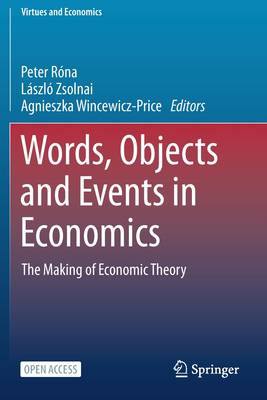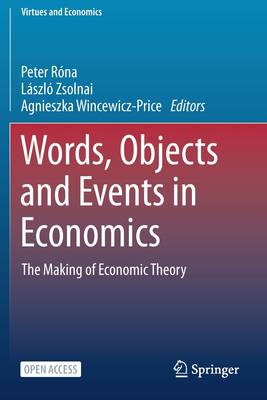
- Afhalen na 1 uur in een winkel met voorraad
- Gratis thuislevering in België vanaf € 30
- Ruim aanbod met 7 miljoen producten
- Afhalen na 1 uur in een winkel met voorraad
- Gratis thuislevering in België vanaf € 30
- Ruim aanbod met 7 miljoen producten
Zoeken
Words, Objects and Events in Economics
The Making of Economic Theory
€ 52,95
+ 105 punten
Omschrijving
This open access book examines from a variety of perspectives the disappearance of moral content and ethical judgment from the models employed in the formulation of modern economic theory, and some of the papers contain important proposals about how moral judgment could be reintroduced in economic theory. The chapters collected in this volume result from the favorable reception of the first volume of the Virtues in Economics series and represent further contributions to the themes set out in that volume: (i) examining the philosophical and methodological fallacies of this turn in modern economic theory that the removal of the moral motivation of economic agents from modern economic theory has entailed; and (ii) proposing a return descriptive economics as the means with which the moral content of economic life could be restored in economic theory.
This book is of interest to researchers and students of the methodology of economics, ethics, philosophers concerned with agency and economists who build economic models that rest in the intention of the agent.
This book is of interest to researchers and students of the methodology of economics, ethics, philosophers concerned with agency and economists who build economic models that rest in the intention of the agent.
Specificaties
Betrokkenen
- Uitgeverij:
Inhoud
- Aantal bladzijden:
- 226
- Taal:
- Engels
- Reeks:
- Reeksnummer:
- nr. 6
Eigenschappen
- Productcode (EAN):
- 9783030526757
- Verschijningsdatum:
- 4/09/2021
- Uitvoering:
- Paperback
- Formaat:
- Trade paperback (VS)
- Afmetingen:
- 156 mm x 234 mm
- Gewicht:
- 344 g

Alleen bij Standaard Boekhandel
+ 105 punten op je klantenkaart van Standaard Boekhandel
Beoordelingen
We publiceren alleen reviews die voldoen aan de voorwaarden voor reviews. Bekijk onze voorwaarden voor reviews.










